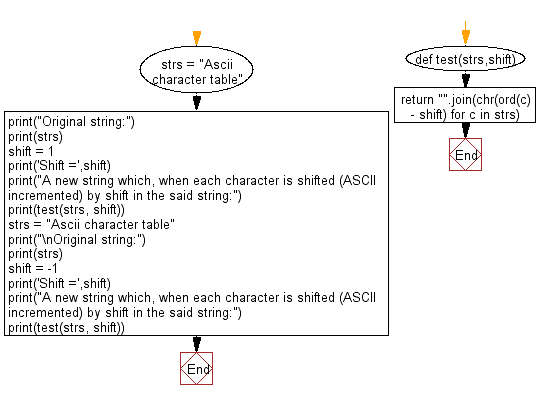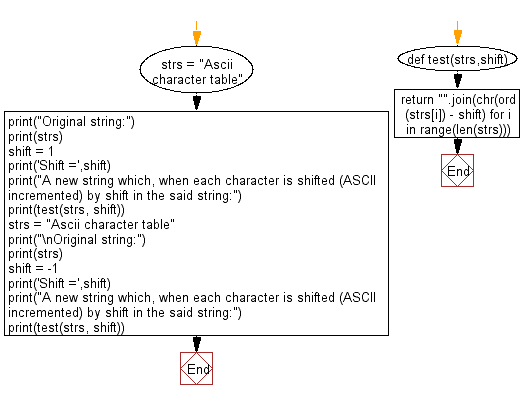Python: Find a string which, when each character is shifted (ASCII incremented) by shift
Python Programming Puzzles: Exercise-67 with Solution
Write a Python program to find a string which, when each character is shifted (ASCII incremented) by shift, gives the result.
Input: Ascii character table Shift = 1 Output: @rbhh bg`q`bsdq s`akd Input: Ascii character table Shift = -1 Output: Btdjj!dibsbdufs!ubcmf
Sample Solution-1:
Python Code:
#License: https://bit.ly/3oLErEI
def test(strs,shift):
return "".join(chr(ord(c) - shift) for c in strs)
strs = "Ascii character table"
print("Original string:")
print(strs)
shift = 1
print('Shift =',shift)
print("A new string which, when each character is shifted (ASCII incremented) by shift in the said string:")
print(test(strs, shift))
strs = "Ascii character table"
print("\nOriginal string:")
print(strs)
shift = -1
print('Shift =',shift)
print("A new string which, when each character is shifted (ASCII incremented) by shift in the said string:")
print(test(strs, shift))
Sample Output:
Original string: Ascii character table Shift = 1 A new string which, when each character is shifted (ASCII incremented) by shift in the said string: @rbhh bg`q`bsdq s`akd Original string: Ascii character table Shift = -1 A new string which, when each character is shifted (ASCII incremented) by shift in the said string: Btdjj!dibsbdufs!ubcmf
Flowchart:

Visualize Python code execution:
The following tool visualize what the computer is doing step-by-step as it executes the said program:
Sample Solution-2:
Python Code:
#License: https://bit.ly/3oLErEI
def test(strs,shift):
return "".join(chr(ord(strs[i]) - shift) for i in range(len(strs)))
strs = "Ascii character table"
print("Original string:")
print(strs)
shift = 1
print('Shift =',shift)
print("A new string which, when each character is shifted (ASCII incremented) by shift in the said string:")
print(test(strs, shift))
strs = "Ascii character table"
print("\nOriginal string:")
print(strs)
shift = -1
print('Shift =',shift)
print("A new string which, when each character is shifted (ASCII incremented) by shift in the said string:")
print(test(strs, shift))
Sample Output:
Original string: Ascii character table Shift = 1 A new string which, when each character is shifted (ASCII incremented) by shift in the said string: @rbhh bg`q`bsdq s`akd Original string: Ascii character table Shift = -1 A new string which, when each character is shifted (ASCII incremented) by shift in the said string: Btdjj!dibsbdufs!ubcmf
Flowchart:

Visualize Python code execution:
The following tool visualize what the computer is doing step-by-step as it executes the said program:
Python Code Editor :
Have another way to solve this solution? Contribute your code (and comments) through Disqus.
Previous: Find the indices of the closest pair from given a list of numbers.
Next: Find all 5's in integers less than n that are divisible by 9 or 15.
What is the difficulty level of this exercise?
Test your Programming skills with w3resource's quiz.
Python: Tips of the Day
Find current directory and file's directory:
To get the full path to the directory a Python file is contained in, write this in that file:
import os dir_path = os.path.dirname(os.path.realpath(__file__))
(Note that the incantation above won't work if you've already used os.chdir() to change your current working directory, since the value of the __file__ constant is relative to the current working directory and is not changed by an os.chdir() call.)
To get the current working directory use
import os cwd = os.getcwd()
Documentation references for the modules, constants and functions used above:
- The os and os.path modules.
- The __file__ constant
- os.path.realpath(path) (returns "the canonical path of the specified filename, eliminating any symbolic links encountered in the path")
- os.path.dirname(path) (returns "the directory name of pathname path")
- os.getcwd() (returns "a string representing the current working directory")
- os.chdir(path) ("change the current working directory to path")
Ref: https://bit.ly/3fy0R6m
- New Content published on w3resource:
- HTML-CSS Practical: Exercises, Practice, Solution
- Java Regular Expression: Exercises, Practice, Solution
- Scala Programming Exercises, Practice, Solution
- Python Itertools exercises
- Python Numpy exercises
- Python GeoPy Package exercises
- Python Pandas exercises
- Python nltk exercises
- Python BeautifulSoup exercises
- Form Template
- Composer - PHP Package Manager
- PHPUnit - PHP Testing
- Laravel - PHP Framework
- Angular - JavaScript Framework
- Vue - JavaScript Framework
- Jest - JavaScript Testing Framework
